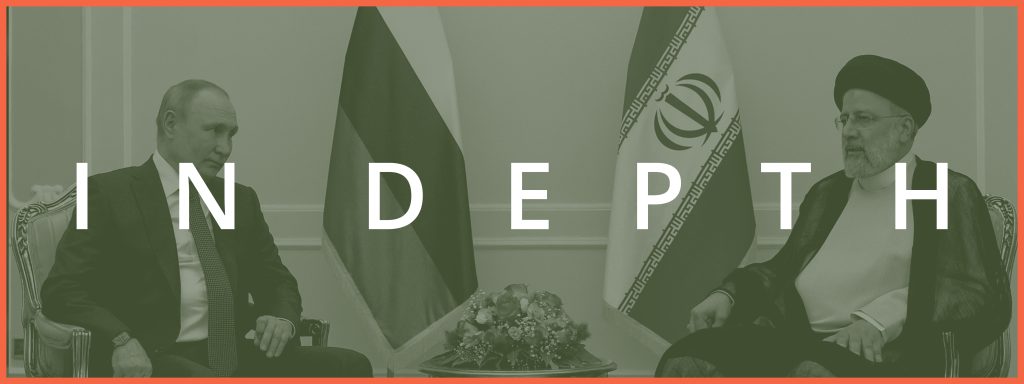Welcome to The Dekleptocracy Report! The Dekleptocracy Project (TDP) is a 501(c)(3) based in Virginia. We’re on a mission to show how existing levers of accountability can protect democracy and prevent authoritarians, their networks, and enablers from exploiting or circumventing the US system. We’re doing this by harnessing OSINT and anticorruption tools to solve foreign policy problems. |
This newsletter provides news and analysis from TDP’s global network about Russia’s war machine and how governments and civil society can use existing levers of influence to weaken it to help bring about a decisive end to this aggression. Please forward this newsletter or our signup page to interested colleagues. |
THE BLUF (Bottom Line Up Front)
Welcome to TDP’s second newsletter. Thank you to everyone who has subscribed and provided feedback on our debut issue. In this issue, we take a deeper look at a geopolitical relationship that is central to conflicts in the Middle East, Europe, and beyond, from Syria to Gaza to Russia’s more than 600-day aggression against Ukraine: the emerging Russian-Iran axis. Since its beginning amidst the Syrian Civil War, this partnership has intensified since Russia attacked Ukraine in February 2022. Working at speed, the countries are completing a single transport corridor from the northern Caspian to the Strait of Hormuz. Besides much-vaunted Shahid drones, Iranian exports to Russia have mushroomed and Moscow and Tehran are working to exploit the gaps in the very different sanctions regimes between the two countries. This growing “Axis of Kleptocrats” undermines the American-led post-WWII order.
For Ukrainians, Syrians, Israelis, Yemenis, Gazans and many more, this emerging alliance threatens their very existence as Iran is able to monetize and expand its short-range and ballistic missile programs with Russian support and eager custom. But this Axis of Kleptocrats resonates beyond the Middle East and Europe; it is a global concern as China provides a crucial technological and financial backstop for both countries’ battered economies. The OSINT community plays an important role in exposing the networks of both countries, but especially efforts to bring more Iranian weapons into the Ukrainian and the wider Middle Eastern theater via proxies like Hamas, Hezbollah, the Houthis, and Iran-backed Syrian and Iraqi militias. And we need to work with Western governments to identify and sanction the components of these networks to prevent them from accessing crucial Western kits needed to keep their war machines going.
In the Digest, we look at an important and welcome step in this direction, a blockbuster round of sanctions designating 130 entities for facilitating sanctions evasion both inside and outside of Russia. Crucially, it targets international networks and calls out “hubs” for supplying Russia with crucial dual-use items in China, Turkey and UAE. This was a massive undertaking by the US Treasury and we hope it can be a model for going after hundreds more enablers and front companies, wherever they may be. By contrast, we highlight two important investigations by Insider and Investigate Europe that demonstrate that European companies continue to supply crucial components for Russia’s most advanced missile system while European governments remain woefully dependent on Russian imports for so-called “critical raw materials.”
As we see in Qui Custodiet, there’s little sign that Europe’s forthcoming 12th package of Russia sanctions will plug these gaps. It is a hallmark of the EU’s decision-making process that, unlike in the US and UK, the composition of these sanctions will be litigated mostly in public and require all 27 member countries to confirm it, giving Russia ample time to prepare. In the UK, a freedom of information request reported by the Financial Times found around 130 UK entities self-reported sanctions violations in the first 15 months after Russia’s full-scale invasion of Ukraine, a number that appears suspiciously low. And, while a contentious article in Time once again put the focus on the issue of corruption in Ukraine, we recall that Ukraine has made important progress on this front and repeat the suggestion of a leading Georgian expert in the field that we rally around (not against) Ukraine on this issue, supporting its very real and active fight to weed out Russian-sponsored strategic corruption efforts in the country going back decades.
Looking at the wider world, we also look at the trial of a former pro-Kremlin, Austrian chancellor once dubbed a “wunderkind,” who has become one of the first of Putin’s political supporters in the EU to face a prison cell. In Slovakia, a pro-Ukrainian government was recently ousted by a populist coalition led by third-time PM Robert Fico, a seasoned populist. His pro-Russian sentiments may not run very deep, but he too will be angling for a buy-off from Brussels over sanctions and Ukraine aid. We also note that the first time the US has targeted Myanmar’s main oil company for sanctions, targeting the key source of hard currency for the junta in a bid to keep it from waging war against its own population.
For more information or to provide feedback about the issues raised in this newsletter, contact [email protected]

Axis of Kleptocrats
Over the past 18 months, Russia’s close cooperation with Iran has become central to its war effort in Ukraine. Iran’s supply of Shahid drones — deployed primarily to terrorize Ukrainian cities — has won the most attention. Since Russia’s full-scale invasion of Ukraine, however, a bigger and even more worrying story of vast economic and military cooperation is emerging. It is also an important building block in a wider Chinese-led alliance, with Beijing acting as a key enabler and partner of both countries. This front challenges Western interests on a global scale and has little interest in promoting democratic development.
Understanding the axis of two kleptocratic dictatorships with murderous agendas against the world order is crucial if we are going to use our existing tools — including sanctions and political and kinetic resources — to protect our allies. Projects to expand direct trade flows from Russia’s Caspian seaports to the Persian Gulf and the creation of bank payment systems that circumvent sanctions are essential lifelines for Russia’s war-mobilized economy and Iran’s ability to project power in the region. Their true purpose, though, as ever, is to preserve and enrich the elite of both kleptocracies. Continue reading…

US targets Russian war machine with a major round of new sanctions
On November 2, the US Treasury Department added 130 entities to the Specially Designated Nationals and Blocked Persons (SDN) list, targeting networks linked to Russian sanctions evasion and its military-industrial complex. The Treasury announcement contains tough language and, commendably, calls out China, Turkey and the UAE as “hubs for exporting, re-exporting, and transshipping to Russia foreign-made technology and equipment.” Continue reading…
Europe keeps supplying Russian missile makers
Russia boasts that its Kinzhal missile system is hypersonic and invulnerable to interception, both demonstrable fibs. Still, it is as potentially dangerous as the Iskander missile, which it is a modified, air-launched version, and harder to stop. Continue reading…
EU continues importing “critical” raw materials from Russia
Between March 2022 and July 2023, the European Union imported around €13.7 billion ($14.4 billion) worth of critical and strategic raw materials, according to Eurostat. Writing in EUObserver in late October, researchers from Investigate Europe asked why Europe, after 11 rounds of sanctions against Russia, remains dependent on its main adversary for 34 critical products, including nickel, titanium and aluminum. Worse, they are buying many of these minerals directly or indirectly from some of Russia’s most prominent (and sanctioned) oligarchic figures or state companies contributing directly to the war effort. Continue reading…

EU compiles another sanctions package
The EU’s sanctions development process is usually a more drawn-out and public affair than the stealthy US and UK systems, a reflection of 27 countries with very different economic and geopolitical relationships with Russia having to unanimously agree to them. Continue reading…
UK companies admit Russian collusion
More than 100 UK companies self-reported sanctions violations related to Russia to His Majesty’s Treasury since the first round of post-2014 sanctions in February 2022 through mid-May 2023. The data comes from a freedom of information request filed by a UK law firm and reported by the Financial Times in early November. Continue reading…
Flipping the script on Ukraine corruption claims
An article by American journalist Simon Shuster in Time at the end of October dismayed many Ukrainians and their allies for its portrayal of Ukraine’s president as a lonely and embattled figure. The report covered Ukrainian President Volodymyr Zelenskyy’s return to Kyiv from a visit to the US in September and his reaction to events in Israel in early October. Continue reading…

Former Austrian chancellor on trial
Former Austrian Chancellor and “wunderkind” of European conservatives Sebastian Kurz went on trial in Vienna in mid-October for allegedly providing false testimony to a corruption inquiry. It’s a hard fall for Kurz, who became Austria’s leader in 2017 at the age of 31. But he had to pull the plug on his coalition government when a hoaxer caught a coalition partner on camera trying to solicit money from a woman purporting to be the daughter of a Russian oligarch. After hanging up the political spurs, he went to work for Peter Thiel. Now he faces potential imprisonment over an investigation of his own alleged corruption, including paying for favorable media coverage. Continue reading…
Fighting the political war on Russia’s borders
Slovakia’s Prime Minister Robert Fico formed a new coalition government in mid-October after elections weeks earlier. One of his platforms has been to curtail aid to Ukraine — citing corruption, something he and his previous governments know something about — and he could play hardball in signing up for the next round of EU sanctions on Russia. Continue reading…
USG targets Myanmar oil company
The US imposed sanctions on Myanma Oil and Gas Enterprise (MOGE) in late October, targeting one of the key sources of finance for Myanmar’s ruling junta, along with other entities and individuals. The step was notable as the US for the first time went after the regime’s foreign exchange lifelines allowing it to buy weapons and keep a corrupt stranglehold on the country’s economy. The US Treasury estimated MOGE supplies “hundreds of millions” of dollars each year. As in Russia and Belarus over the past decade, the targeting of large state and quasi-state enterprises represents an important step from the narrower targeting of regime figures and their allies. Earlier this year, the US targeted two key banks. It will be important to watch if the junta is able to exploit corruption networks in the region (as it has done for many years in timber, for instance) to ensure it has the resources to continue to terrorize its population.
